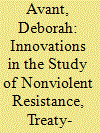| Srl | Item |
| 1 |
ID:
160472


|
|
|
|
|
| Summary/Abstract |
The third issue of JoGSS’ third volume opens with a special, guest-edited section introducing new ways to explore nonviolent resistance—a form of conflict in which unarmed persons use a wide variety of coordinated tactics to push for change without harming others. As Braithwaite and Braithwaite note in their introduction to the special section, the quantitative study of nonviolent resistance has recently become much more prominent in the field. They curated for this issue a series of new studies that disaggregate actors and tactics to uncover new insights regarding the role of ethnic power relations on the participant bases of nonviolent and violent resistance campaigns, the role of fear of victimization in patterns of mobilization, the effects of state response in protest dynamics, the role of national trade unions in the duration and outcomes of nonviolent campaigns, and the role of the United Nations in the diffusion of norms of nonviolence across secessionist movements.
|
|
|
|
|
|
|
|
|
|
|
|
|
|
|
|
| 2 |
ID:
160479


|
|
|
|
|
| Summary/Abstract |
Multilateral treaty-making is a venerable tool for navigating a sovereignty-constrained world. But that is not all; it is also a taken-for-granted practice of the international system, constitutive of both state actors and the international system itself. Constitutive practices are meaningful social actions that serve to circumscribe thought and action in the social world, delineating and in part generating both agents and the system in which they operate. Multilateral treaty-making is one such practice. While states make treaties, so too does treaty-making make states. Multilateral treaty-making can and does serve the instrumental interests of states, but exploring the constitutive nature of treaty-making is an inquiry into the foundations upon which those instrumental calculations are made—why have states turned to this practice in pursuit of their interests? In this article we provide a mixed-method approach to observing the constitutive dynamics described by practice theory that have thus far proven relatively elusive to capture empirically. In so doing our inquiry provides a fuller understanding of a foundation of competent statehood and of the international system in which states operate.
|
|
|
|
|
|
|
|
|
|
|
|
|
|
|
|